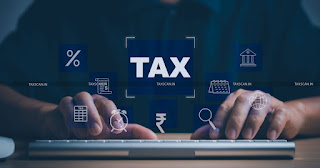Tax compliance has always been a complex and time-consuming process for businesses and individuals. However, with rapid advancements in technology, automation, and artificial intelligence (AI), tax compliance has become more efficient, accurate, and transparent. Governments worldwide, including India, are leveraging technology to streamline tax filing, improve compliance monitoring, and reduce tax evasion.
In this blog, we will explore how technology is transforming tax compliance, the latest digital trends, and what businesses should do to stay ahead.
How Technology is Revolutionizing Tax Compliance
Technology is playing a critical role in reshaping tax administration by:
1. Digital Tax Filing and E-Assessments
- The Indian government introduced e-filing and faceless assessment to make tax processes more efficient and reduce human intervention.
- The Income Tax Department's e-filing portal allows taxpayers to file returns, verify documents, and track refunds easily.
2. Automation and Artificial Intelligence (AI)
- AI-driven tax bots help businesses automate tax calculations and ensure compliance with GST, income tax, and TDS regulations.
- Machine learning algorithms detect discrepancies in tax filings and identify potential fraud or underreporting.
3. Blockchain for Secure Transactions
- Blockchain technology is improving data security and reducing tax fraud by providing a tamper-proof ledger of financial transactions.
- This ensures transparency in GST invoices, digital payments, and audit trails.
4. Cloud-Based Tax Solutions
- Businesses now use cloud-based tax software like Cleartax, Zoho Books, and Tally for real-time tax calculations and compliance tracking.
- Cloud platforms reduce paperwork, improve collaboration, and ensure data security.
5. Big Data and Predictive Analytics
- Governments analyze big data from various sources (bank transactions, GST filings, digital payments) to track tax compliance.
- Predictive analytics help tax authorities identify potential defaulters and take preventive actions.
6. E-Invoicing and GST Automation
- The introduction of e-invoicing under GST ensures real-time reporting of transactions, reducing tax evasion and errors.
- GST reconciliation tools match input tax credit (ITC) claims with supplier invoices, reducing fraud risks.
Benefits of Technology in Tax Compliance
✅ Improved Accuracy and Reduced Errors
Automation and AI minimize human errors in tax calculations, ensuring precise tax filings and accurate GST input tax credit claims.
✅ Faster Processing and Reduced Delays
E-filing and digital assessments significantly reduce processing times for income tax refunds, TDS compliance, and GST filings.
✅ Enhanced Transparency and Fraud Prevention
Blockchain, AI, and data analytics help identify suspicious transactions, ensuring transparency and reducing tax fraud.
✅ Cost Savings for Businesses
Cloud-based tax solutions reduce the need for expensive compliance teams, lowering operational costs for businesses.
✅ Better Compliance Monitoring
Real-time tracking of invoices, expenses, and tax payments ensures businesses remain compliant with Income Tax, GST, and corporate tax regulations.
Technological Advancements in Indian Taxation
India has been at the forefront of tax digitalization. Some key initiatives include:
1. Goods and Services Tax Network (GSTN)
- A centralized IT system that automates GST return filing, tax payments, and compliance tracking.
- Integrates with banks, tax authorities, and businesses to ensure seamless tax collection.
2. Faceless Tax Assessments
- The Income Tax Department introduced faceless assessments to eliminate human bias and corruption.
- Taxpayers can submit responses and documents digitally, reducing physical interactions.
3. Digital Taxpayer Services
- Automated chatbot support for answering tax-related queries.
- Instant PAN card issuance through Aadhaar-based verification.
- Pre-filled ITR forms to simplify income tax return filing.
4. E-Way Bill System
- Automated tracking of goods movement across states, ensuring GST compliance.
- Reduces tax evasion and speeds up inter-state trade by minimizing checkpoints.
5. Income Tax Compliance Dashboard
- A centralized dashboard providing businesses with real-time insights into tax obligations, pending payments, and filing deadlines.
Challenges of Digital Tax Compliance
Despite technological advancements, there are still challenges in digital tax compliance:
🚨 Cybersecurity Risks – Increased reliance on digital platforms raises concerns about data breaches and hacking.
🚨 System Downtime Issues – Frequent technical glitches in government portals can delay filings.
🚨 Adaptation by Small Businesses – Many MSMEs lack awareness and struggle to transition to digital tax platforms.
🚨 Compliance Complexity – Frequent tax rule changes make it difficult for businesses to keep up.
Future of Technology in Tax Compliance
The future of tax compliance will see:
🔹 AI-powered tax assistants to help businesses manage filings effortlessly.
🔹 Advanced blockchain integration for real-time GST and TDS reconciliation.
🔹 More automation in tax audits, reducing manual intervention.
🔹 Expanded use of predictive analytics to forecast tax liabilities and detect fraud.
Conclusion
Technology has transformed tax compliance, making it faster, more transparent, and cost-effective. Businesses and individuals must adapt to digital tax tools to stay compliant and avoid penalties.
💡 Need expert tax compliance solutions?
Verotus Finlegal Solutions LLP can help you navigate tax laws with AI-driven compliance tools and expert advisory services.
📞 Call us at 7066336680 or visit
🌐 www.verotusllp.com for tailored tax solutions! 🚀


